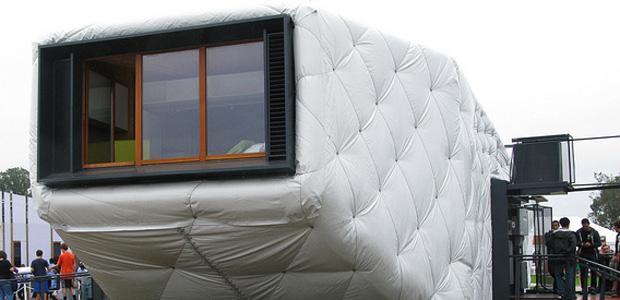Slideshow: Solar Power Decathlon in DC
Caltech’s entry uses exterior insulation wrapped with vinyl and metal cabling to acheive the “puffy house” look. (Photo: Eric Niiler)
By Eric Niiler
Ben Jagersma loads up a dishwasher in a wood-frame home that has traveled more than 9,000 miles from Wellington, New Zealand, to a patch of grass near the National Mall. Jagersma helps one of the judges put a temperature sensor inside the machine — testing how much energy it uses to wash dirty dishes.
As engineering captain of the Victoria University of Wellington team, Jagersma leaves nothing to chance. Nineteen schools are battling for green power supremacy in the 10-day Solar Decathlon, an Energy Department-sponsored competition that tests students’ engineering and architectural skills in building energy-efficient solar powered homes. This year, four international teams have entered the contest.
Judges measure everything from energy use and comfort level to market appeal and affordability. The Kiwis have designed a “bach,” or holiday home, that uses natural resources to save energy — in this case, a coat of wool to keep it warm.
“In New Zealand, we have more sheep than people,” Jagersma said. “Sheep wool insulation is a really good, really high performing product. It insulates the walls and floor and roof really well.”
Inside, sliding glass doors face north and south, while solar panels soak up the elusive sun on the roof. Jagersma’s next task is to use solar-powered hot water to wash — and dry — a few towels.
“All week we’ve been battling with cloudy skies in Washington, DC,” he said.
His team has invented a special drying closet that uses solar-heated water pumped through a set of metal racks.
“The best that we’ve done in the competition here in the past 10 days is two-and-a-half hours to dry the six bath towels. Today, I predict we’ll be close to two hours.”
If it works, the solar-powered closet will consume 200 watts of energy, compared to the 1,500 to 5,000 watts used by typical clothes dryer.
Every team has come up with special ways to save energy. The University of Tennessee installed solar panels by the now-bankrupt firm Solyndra. Students from Belgium’s Ghent University designed a two-story, do-it-yourself home called the E-Cube.
Charlotte Delhuvenne said their priority is keeping labor costs down.
“Normally, in Belgium we build with bricks, but with this system everything goes very fast,” she said, adding that in Washington, about 30 students built the house in about three to four days. The boxy structure is put together with aluminum material that holds up pre-fabricated wall panels.
“The structure is a shelving system like you find in warehouses. It’s very easy to assemble. It’s cheap, flexible,” Delhuvenne said.
Flexibility and re-usability is job one for the team from Shanghai’s Tongji University. They put three metal shipping containers together in a Y-shape for their home design. A Japanese firm donated advanced solar panels that pick up even small amounts of light, said engineering student Jin Linhui.
“We can still get energy during the rainy weather,” he said. “It can collect direct sunshine and also the radiant sunshine.”
The U.S. Department of Energy gave each team $100,000, while commercial sponsors donated building materials, appliances and technical help. The teams have to keep their overall budget under $250,000, or face a penalty. Jin said he believes his team’s design may persuade a few people back home in China to invest in solar power.
“Although we are a big country, and we have so many people, we have to save energy. It’s very hard work for the country.”
As the afternoon winds down, all the teams gather under a big tent to hear the results of the engineering contest. New Zealand gets first place for engineering, an upset victory.
The Kiwis hope it gives them momentum for the overall championship; the winner will be announced Saturday. When the decathlon ends, most houses will be disassembled and sent back as class projects. But New Zealand’s green home has already been sold. A woman in Christchurch said she plans to live in it.
